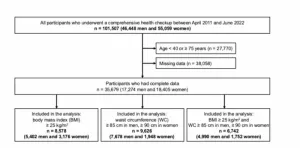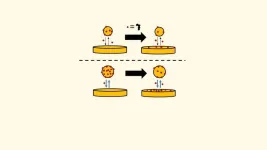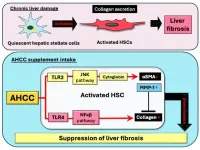(Press-News.org) A new study from the Robert N. Butler Columbia Aging Center at the Mailman School of Public Health reveals significant improvements in the health of older adults in England when compared to previous generations. Rather than considering health through the presence or absence of disease, the study, published in Nature Aging, applied a new approach that examined trends in people’s functioning – their cognitive, locomotor, psychological, and sensory capacities.
Using data from the English Longitudinal Study of Aging, the study found that older adults today experience higher levels of physical and mental functioning than previous generations did at the same age.
“These improvements were large,” said John Beard, MBBS, PhD, Irene Diamond Professor of Aging in Health Policy and Management in the Butler Columbia Aging Center of Columbia University Mailman School of Public Health and author of the study. For example, a 68-year-old born in 1950 had a similar capacity to a 62-year-old born a decade earlier, and those born in 1940 had better functioning than those born in 1930 or 1920. Beard noted, “If we had compared someone born in 1950 with someone born in 1920, we would have likely observed even greater improvements.”
Beard and his colleagues undertook similar analyses in the China Health and Retirement Longitudinal Study (CHARLS). They found similar trends, although this analysis was limited by the much shorter follow-up period in the Chinese study compared to the English study.
Beard says that improvements in education, nutrition, and sanitation over the course of the twentieth century are likely to have played a key role. Medical advances—such as joint replacements and better treatments for chronic conditions—were also likely to be contributing factors. The researchers caution, however, that their observations are for a specific period and in a single country. The same trends may not have been seen in the US, or across the whole of the population.
“We were surprised by just how large these improvements were, particularly when comparing people born after World War Two with earlier-born groups.” said Beard. “But there is nothing to say we will continue to see the same improvements moving forward, and changes such as the increasing prevalence of obesity may even see these trends reverse. It is also likely that more advantaged groups will have experienced greater gains than others. But overall, the trends were very strong and suggest that, for many people, 70 really may be the new 60.”
Aging expert Jay Olshansky of the University of Illinois praised the study, stating, “This is a powerful article. It shows that intrinsic capacity—what really matters to people as they age—is inherently modifiable. With this evidence, we see that medical science can enhance intrinsic capacity, providing a hopeful message for the future.”
Co-authors are Katja Hanewald and Yafei Si, UNSW Business School, Sydney, Australia; ARC Centre of Excellence in Population Aging Research (CEPAR), Australia; Jotheeswaran Amuthavalli Thiyagarajan, Department of Maternal, Child, Adolescent Health and Aging, World Health Organization, Geneva; and Dario Moreno-Agostino, UCL Social Research Institute, University College London, and ESRC Centre for Society and Mental Health, King’s College London.
The research was supported by the ARC Centre of Excellence in Population Ageing Research (CEPAR, project CE170100005) at the University of New South Wales (UNSW); Economic and Social Research Council (ESRC) Centre for Society and Mental Health at King’s College London [ES/S012567/1]; and the National Social Science Foundation of China (23AZD091). Funding was also provided by the National Institute on Aging (R01 AG030153, RC2 AG036619, R03 AG043052), and (R01 AG030153, RC2 AG036619, and R03 AG043052).
The Robert N. Butler Columbia Aging Center
Bringing together the campus-wide resources of a top-tier research university, the Robert N. ButlerColumbia Aging Center approach to aging science is an innovative, multidisciplinary one with an eye to practical and policy implications. Its mission is to add to the knowledge base needed to better understand the aging process and the societal implications of our increased potential for living longer lives. For more information about this center which is based at the Columbia Mailman School of Public Health, please visit: aging.columbia.edu.
Columbia University Mailman School of Public Health
Founded in 1922, the Columbia University Mailman School of Public Health pursues an agenda of research, education, and service to address the critical and complex public health issues affecting New Yorkers, the nation and the world. The Columbia Mailman School is the third largest recipient of NIH grants among schools of public health. Its nearly 300 multi-disciplinary faculty members work in more than 100 countries around the world, addressing such issues as preventing infectious and chronic diseases, environmental health, maternal and child health, health policy, climate change and health, and public health preparedness. It is a leader in public health education with more than 1,300 graduate students from 55 nations pursuing a variety of master’s and doctoral degree programs. The Columbia Mailman School is also home to numerous world-renowned research centers, including ICAP and the Center for Infection and Immunity. For more information, please visit www.mailman.columbia.edu.
END
Living organisms monitor time – and react to it – in many different ways, from detecting light and sound in microseconds to responding physiologically in pre-programmed ways, via their daily sleep cycle, monthly menstrual cycle, or to changes in the seasons.
Such ability to react at different timescales is made possible via molecular switches or nanomachines that act or communicate as precise molecular timers, programmed to turn on and off in response to the environment and time.
Now, ...
Artificial intelligence that is as intelligent as humans may become possible thanks to psychological learning models, combined with certain types of AI. This is the conclusion of Robert Johansson, who in his dissertation from Linköping University has developed the concept of Machine Psychology and how it can contribute to AI development.
Artificial General Intelligence (AGI) has been the holy grail of AI research since the 1950s. So far, humanity has not managed to create an artificial intelligence that can solve intellectual tasks in the same way ...
Walking speed can provide insights into health, extending beyond mere mobility, so much so that it is considered to be the “sixth vital sign.” Past studies have suggested that a slow walking speed is correlated with the development of cardiovascular diseases and an increased risk of mortality in the elderly.
A recent study led by Prof. Kojiro Ishii from Doshisha University, in collaboration with Dr. Yukio Yamamoto, Dr. Kentaro Ikeue, Dr. Kan Oishi, and Dr. Takaaki Mori from Doshisha University, ...
HOUSTON-(Dec. 18, 2024) –Houston Methodist researchers have discovered that certain components of so-called “good” cholesterol -- high-density lipoproteins (HDL) – may be associated with an increased prevalence of cardiovascular disease.
Led by Henry J. Pownall, Ph.D., professor of biochemistry in medicine at the Houston Methodist Research Institute, and Khurram Nasir, M.D., M.P.H., a cardiologist and division chief of cardiovascular prevention and wellness at Houston Methodist, the research team is using innovative methods to investigate the role of certain properties of HDL in heart health.
“During ...
Chronic liver damage can lead to hepatitis, which causes fibrosis of the liver. This buildup of collagen and other fibrous tissue accelerates when hepatic stellate cells become activated during hepatitis, often resulting in liver cancer or cirrhosis, both of which can be fatal. As there are no effective drugs to treat cirrhosis, suppressing the activation of the stellate cells is considered as a way of controlling the progression of liver fibrosis.
“It is estimated that one out of every 3-4 ...
Efficient gas separation is vital in various industries, from medical applications to energy production. However, isolating oxygen from mixtures presents a significant technological challenge. Because many gases, including argon and oxygen, share similar physical properties, separating them is difficult. Now, Ryotaro Matsuda and his team at Nagoya University have developed a unique porous metal-organic framework (MOF), which represents a novel approach to gas separation: a combined phenomenon of "adsorption" and "dissolution" that they term the "adsorptive-dissolution" ...
Physical examinations are important diagnostic tools that can reveal critical insights into a patient’s health, but complex conditions may be overlooked if a clinician lacks specialized training in that area. While previous research has investigated using large language models (LLMs) as tools to aid in providing diagnoses, their use in physical exams remains untapped. To address this gap, researchers from Mass General Brigham prompted the LLM GPT-4 to recommend physical exam instructions based on patient symptoms. ...
Inflammation in the hippocampus – the brain’s memory centre – significantly alters motivation and behaviour in mice, including food-seeking behaviour, with notable differences between males and females, a recent study reveals.
The hippocampus plays a crucial role in memory formation, learning and emotional regulation. Hippocampal neuroinflammation occurs in a range of diseases and disorders such as Alzheimer’s, Multiple Sclerosis and Depression.
People with these diseases often experience common symptoms such as apathy, difficulty with daily activities and changes to food preferences. These symptoms also tend to be more severe in women than in men.
“While ...
Almost all leading large language models or “chatbots” show signs of mild cognitive impairment in tests widely used to spot early signs of dementia, finds a study in the Christmas issue of The BMJ.
The results also show that “older” versions of chatbots, like older patients, tend to perform worse on the tests. The authors say these findings “challenge the assumption that artificial intelligence will soon replace human doctors.”
Huge advances in the field of artificial intelligence have led to a flurry of excited and fearful speculation as to whether chatbots can surpass human physicians.
Several studies have shown large ...
Surgeons are quicker and more successful at completing a buzz wire game compared with other hospital staff, finds a study in the Christmas issue of The BMJ.
However, surgeons are also more likely to swear during the task, while nurses and non-clinical staff show the highest rates of audible noises of frustration.
The researchers say their study highlights the diverse skill sets across hospital staff roles, and they suggest surgical swear jars should be considered for future fundraising events.
Within a hospital, ...



